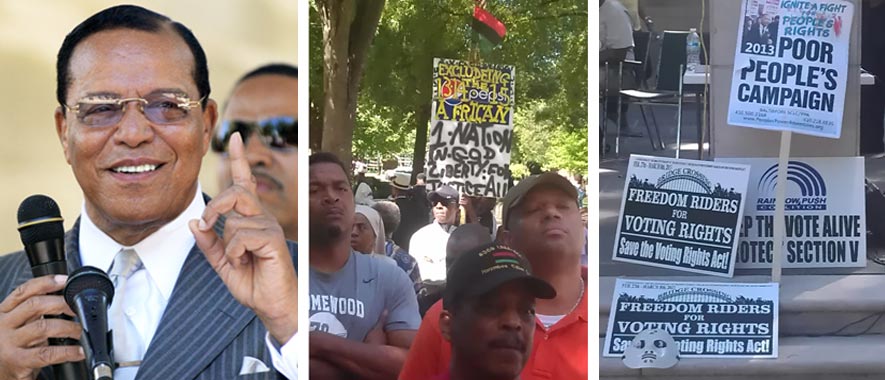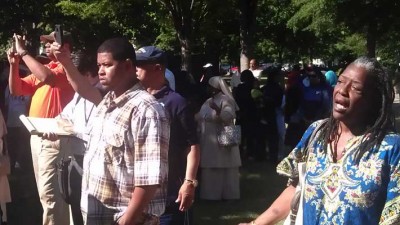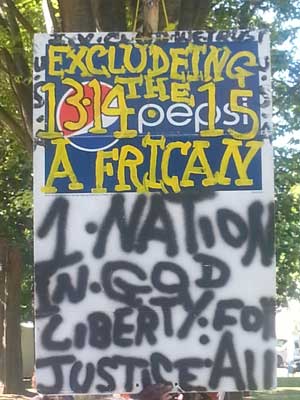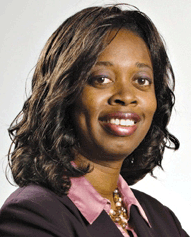|
The Nation of Islam’s Minister Louis Farrakhan sure can pull a crowd. And controversy.

The Nation of Islam’s Minister Louis Farrakhan sure can pull a crowd. And controversy.
His appearances in Birmingham and other Alabama cities last week with the National Coalition of Leaders to Save Section 5 of the Voting Rights Act drew at least 200 people to Kelly Ingram Park. Of course, this hallowed ground was the site of the famous dogs-and-hoses confrontation between nonviolent protesting children and Police Commissioner Eugene “Bull” Connor.
Social media was aflutter with arguments about whether it was appropriate for Farrakhan to be associated with Birmingham’s powerful civil rights heritage, which is centered on Christian principles of love and nonviolence.
Sixteenth Street Baptist Church leaders say Farrakhan didn’t speak at the church steps as scheduled because the organizers didn’t get permission ahead of time. But even if they had, I doubt very seriously that the church’s leaders would have wanted to be associated with Minister Farrakhan. Rally organizer Catrena Norris Carter and State Rep. Merika Coleman said plain fear of the controversial Minister kept some people from attending the rally.
His presence provoked a public outcry from the vocal Birmingham Jewish Federation and the Anti-Defamation League. Jewish leaders and even Christian commentators said in letters and online that Minister Farrakhan is a hater of Jews and Whites, and his very presence in Birmingham and the park desecrated the meaning of the Birmingham Movement, just as the city celebrates the Movement’s Golden Anniversary.
Now, I certainly understand why Jewish leaders would be sensitive about a man who once called Hitler “a great man.” Minister Farrakhan said he meant that Hitler had pulled his nation from the depths of poverty and depression after World War I into a powerhouse nation. But that nation essentially threatened to conquer Europe and institute an Aryan empire at the expense of six million Jews, non-whites and other undesirables that Hitler believed needed to be purged from his pure-White society.
Yes, Minister Farrakhan has a long and tangled relationship with the Jewish community. But he calls out any ethnic group that he believes unjustly diminishes the economic, social and political upward mobility of Blacks or people of color worldwide.
 His willingness to stand up boldly for the rights of African Americans is exactly why organizers who don’t want to see the U.S. Supreme Court strike down Section 5 of the Voting Rights Act invited him in the first place. His willingness to stand up boldly for the rights of African Americans is exactly why organizers who don’t want to see the U.S. Supreme Court strike down Section 5 of the Voting Rights Act invited him in the first place.
State Sen. Hank Sanders of Selma, in a letter to the Birmingham Jewish League’s Richard Friedman, wrote that he understood his concerns about the Minister’s appearance. But he said the Jewish community has not been willing to publicly stand with the African American community in Birmingham or any other city where organizers rallied people to protect a right that took 100 years for Blacks to gain.
“We cannot fault you for whomever you stand with or have stand with you in your struggle. By the same token, we cannot allow you to determine who stands with us in our struggle,” Sanders wrote. “I appreciate your [concerns], but the right to vote is too important not to fight will all available resources. Please consider this letter in the spirit in which it is intended – one of forgiveness and inclusion.”
While I too don’t agree with everything the Minister says, I agree with the essence of his speech last week:
“. . . to cut out Section 5 of the Voting Rights bill is to take out the enforcement to make sure the recalcitrant of some of those who never wanted us to vote in the first place would now be free to keep us going back and forth to court, litigating and litigating and litigating. Hell with litigation! They keep you spending money going back to court. No. We want laws enforced. We want justice. We can’t settle for anything less.
They call me a hater, in the face of Alabama hatred. I didn’t segregate Black children. I didn’t tell Black people you can’t be buried here, not to drink water there. Louis Farrakhan did not do that that. I did not deprive any Jewish person of the right to worship God in the manner that they choose. But to bomb a church is the epitome of hatred and total disrespect . . . You cannot find one synagogue I desecrated. You cannot find one Jewish person I have harmed, except I refuse to be silent when I know the truth. And it was Jesus who said, ‘You shall know the truth, and the truth will set us free.”
So, from Alabama and Shelby County, where this court case [against Section 5 of the Voting Rights Act] originated, let’s have a movement and let’s keep on moving until we can say with truth, I thank God Almighty. I’m not going to keep singing, ‘We Shall Overcome.’ I’m longing for the day we can say, together, ‘We Have Overcome,’ so truly we are free at last.”
In many ways, Minister Farrakhan sounded like Dr. King, even quoting from one of his speeches. Dr. King spoke truth to power.
In a 1968 landmark speech, “The Other America,” three weeks before his assassination, Dr. King flatly said, “America is a racist country. Now however unpleasant that sounds, it is the truth. And we will never solve the problem of racism until there is a recognition of the fact that racism still stands at the center of so much of our nation and we must see racism for what it is.”
But, in contrast to Minister Farrakhan, he called Hitler “a very sick man.”
“He was one of the great tragedies of history. But he was very honest. He took his racism to its logical conclusion,” Dr. King said. And that conclusion – built on racism’s hatred, fear and loathing of “inferior people” plus racists’ power to turn those sentiments into law and deadly action, he said – “is genocide.”
Jewish people know something about genocide. But so do African Americans.
Millions of Black Africans died in the Middle Passage, stacked and packed like sardines for months in the hulls of slave ships that became filled with urine, feces, blood and disease. They were en-route to brutal, humiliating economic exploitation, sometimes death, as human chattel in the “New World,” occupied lands that lost Europeans found searching for new wealth and adventure. Additionally, millions of native peoples (aka “Indians” and “savages”) died as Europeans conquered and confiscated their lands.
No group of people is exempt from the cruelties of human hatred. But Dr. King didn’t fight fire with fire. He learned the power of nonviolence to change people, to change a nation, to change a world.
 Nonviolence is powerful because it’s based in love, the exact opposite of hate. If hate’s logical conclusion is genocide, then love’s logical conclusion is life and brotherhood, for all people. Nonviolence is powerful because it’s based in love, the exact opposite of hate. If hate’s logical conclusion is genocide, then love’s logical conclusion is life and brotherhood, for all people.
I like the best of what the Nation of Islam offers the Black community – self-empowering love, building strong families, creating economically sustainable businesses around the country and around the world, and leveraging political power to protect its interests, without detriment to other people.
Now if we can marry those positives with the Beloved Community, the brotherhood of all men, as Dr. King understood (even Malcolm X began to embrace this notion at the end of his life), then we will have truly reached the Promised Land. In that land, there is no need for Section 5 of a Voting Rights Act.
Until we reach that land, though, the Supreme Court should rule to keep the enforcement heart of the voting rights law in place, remembering the sacrifice of Blacks and Whites who struggled and died to make it happen.
Photos courtesy W.N. Walker Public Relations
vickii
|











